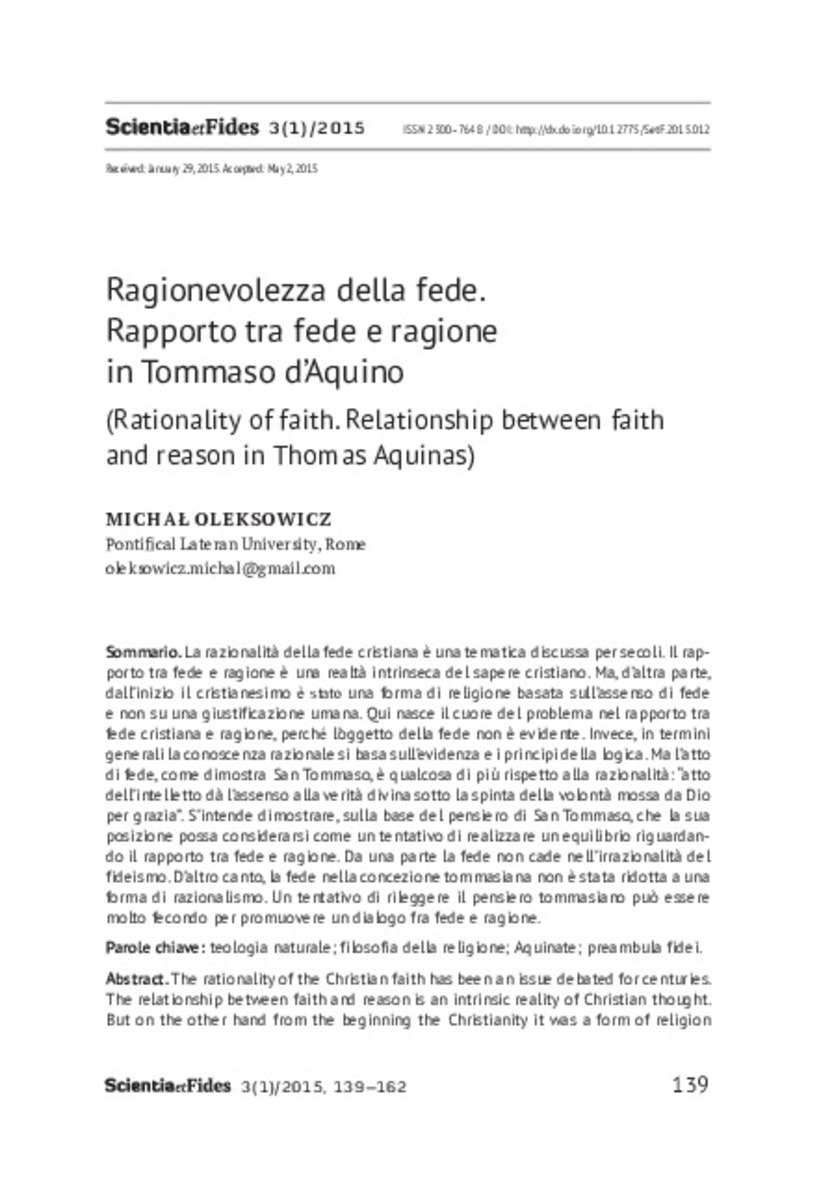Registro completo de metadatos
| Campo DC | Valor | Lengua/Idioma |
|---|---|---|
| dc.creator | Oleksowicz, M. (Michal) | - |
| dc.date.accessioned | 2015-07-03T09:04:00Z | - |
| dc.date.available | 2015-07-03T09:04:00Z | - |
| dc.date.issued | 2015 | - |
| dc.identifier.citation | Olesksowicz, Michal. “Ragionevolezza della fede. Rapporto tra fede e ragione in Tommaso d’Aquino”, Scientia et Fides, Vol. 3, n. 1, 2015, pp.139-162. | es_ES |
| dc.identifier.issn | 2300-7648 | - |
| dc.identifier.uri | https://hdl.handle.net/10171/38703 | - |
| dc.description.abstract | La razionalità della fede cristiana è una tematica discussa per secoli. Il rapporto tra fede e ragione è una realtà intrinseca del sapere cristiano. Ma, d’altra parte, dall’inizio il cristianesimo è stato una forma di religione basata sull’assenso di fede e non su una giustificazione umana. Qui nasce il cuore del problema nel rapporto tra fede cristiana e ragione, perché l’oggetto della fede non è evidente. Invece, in termini generali la conoscenza razionale si basa sull’evidenza e i principi della logica. Ma l’atto di fede, come dimostra San Tommaso, è qualcosa di più rispetto alla razionalità: “atto dell’intelletto dà l’assenso alla verità divina sotto la spinta della volontà mossa da Dio per grazia”. S’intende dimostrare, sulla base del pensiero di San Tommaso, che la sua posizione possa considerarsi come un tentativo di realizzare un equilibrio riguardando il rapporto tra fede e ragione. Da una parte la fede non cade nell’irrazionalità del fideismo. D’altro canto, la fede nella concezione tommasiana non è stata ridotta a una forma di razionalismo. Un tentativo di rileggere il pensiero tommasiano può essere molto fecondo per promuovere un dialogo fra fede e ragione. | es_ES |
| dc.description.abstract | The rationality of the Christian faith has been an issue debated for centuries. The relationship between faith and reason is an intrinsic reality of Christian thought. But on the other hand from the beginning the Christianity it was a form of religion based on the assent of faith and not on a human justification. Here comes the heart of the problem in the relationship between Christian faith and reason, because the object of faith is not obvious. Instead, in general terms the rational knowledge is based on evidence and the principles of logic. But the act of faith, as evidenced by St. Thomas, is something more than the simple rationality: “act of the intellect gives assent to the divine truth under the influence of the will moved by God’s grace”. It is intended to demonstrate, on the basis of the thought of St. Thomas, that his position clearly can be considered as an attempt to achieve a balance covering the relationship between faith and reason. On the one hand, faith does not fall into irrationality of fideism. On the other hand, the faith in the thomistic conception has not been reduced to a form of rationalism. An attempt to read again the thomistic thought can be very fruitful to promote a dialogue between faith and reason. | es_ES |
| dc.language.iso | ita | es_ES |
| dc.publisher | Universidad Nicolás Copérnico de Torun | es_ES |
| dc.rights | info:eu-repo/semantics/openAccess | es_ES |
| dc.subject | Preambula fidei | es_ES |
| dc.subject | Aquinate | es_ES |
| dc.subject | Filosofia della religione | es_ES |
| dc.subject | Teologia naturale | es_ES |
| dc.subject | Preambles of faith | es_ES |
| dc.subject | Aquinas | es_ES |
| dc.subject | Philosophy of religion | es_ES |
| dc.subject | Natural theology | es_ES |
| dc.title | Ragionevolezza della fede. Rapporto tra fede e ragione in Tommaso d’Aquino | es_ES |
| dc.type | info:eu-repo/semantics/article | es_ES |
Ficheros en este ítem:
Estadísticas e impacto
Los ítems de Dadun están protegidos por copyright, con todos los derechos reservados, a menos que se indique lo contrario.






